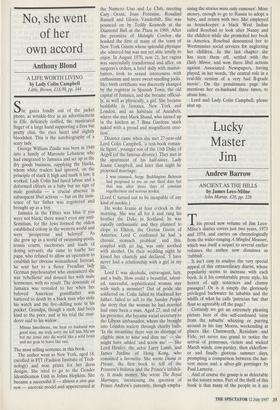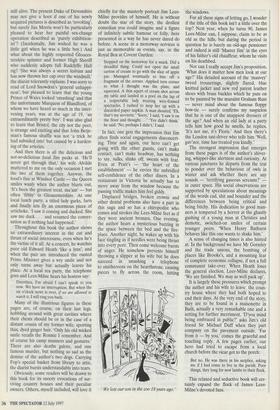Lucky Master Jim
Andrew Barrow
ANCIENT AS THE HILLS by James Lees-Milne John Murray, £20, pp. 228 This proud new volume of Jim Lees- Milne's diaries covers just two years, 1973 and 1974, and carries on chronologically from the wider-ranging A Mingled Measure, which was itself a sequel to several earlier volumes the author now dismisses as `rubbish'.
It isn't easy to analyse the very special appeal of this extraordinary diarist, whose popularity seems to increase with each book. Is it his comfortable prose style, his horror of ugly sentences and clumsy passages? Or is it simply the gloriously privileged backwater he inhabits and the whiffs of what he calls 'patrician fun' that float so agreeably off the page?
Certainly we get an extremely pleasing picture here of this self-confessed `cissy from the suburbs' whizzing or purring around in his tiny Morris, weekending at places like Chatsworth, Renishaw and Firle, yet never too grand to notice the arrival of primroses, violets and wicked March winds, cow-parsley, then elderflow- er and finally glorious summer days, prompting a comparison between the har- vest moon and a silver-gilt porringer by Paul Lamerie.
And of course the gossip is as delectable as the nature notes. Part of the thrill of this book is that many of the people in it are still alive. The present Duke of Devonshire may not give a hoot if one of his newly acquired pictures is described as 'revolting', but surely Jan Morris won't be particularly pleased to hear her painful sex-change operation described as 'purely exhibition- ist'? (Incidentally, Jim wished he was a little girl when he was a little boy.) And what about the highly respected Glouces- tershire spinster and former High Sheriff who suddenly adopts full Radclyffe Hall rig? 'She was always a secret lesbian and has now thrown her cap over the windmill,' the diarist tolerantly explains. I was sorry to read of Lord Snowdon's 'general unhappi- ness', but pleased to learn that the young Prince of Wales looked 'smashing' and that the unfortunate Marquess of Blandford, of whom we have heard so much in the inter- vening years, was at the age of 19, 'an extraordinarily pretty boy'. I was also glad to learn that Bristol, the city not the peer, is strange and exciting and that John Betje- man's famous shuffle was not 'a trick he had subsided into' but caused by a harden- ing of the arteries.
And then there is all the delicious and not-so-delicious food Jim pecks at. 'He'll never get through that,' his wife Alvilde muttered to me on the only occasion I met the two of them together. Anyway, the food's fine at Windsor Castle — the Queen smiles wanly when the author blurts out, `It's been the greatest treat, ma'am' — but often 'filthy' in Gloucestershire. At one local lunch party, a titled lady gurks, farts and finally lets fly an enormous piece of artichoke. 'I saw it coming and ducked. She saw me duck . . . and resumed the conver- sation as if nothing had happened.'
Throughout this book the author shows an extraordinary interest in the cut and thrust of social intercourse, even when he's the victim of it all. At a concert, he watches poor old Edward Heath 'like a lynx', and when the pair are introduced the ousted Prime Minister gives a wry smile and not only turns away but actually leaves his place. At a local tea party, the telephone goes and Lees-Milne hears his hostess say: Dorothea, I'm afraid I can't speak to you
now. We have an interruption. But when the six o'clock news is over, if we are allowed to
watch it, I will ring you back.
Many of the illustrious figures in these pages are, of course, on their last legs, hobbling around with great cavities where their chests should be or in the case of a distant cousin of my former wife, sporting thin, dyed ginger hair. 'Only his old wicked smile recalls the Ronnie I remember. And of course his camp manners and gestures.' There are also deaths galore, and one famous murder, but nothing so sad as the demise of the author's two dogs. Carrying Fop's special basket from library to attic, the diarist bursts understandably into tears.
Obviously, some readers will be drawn to this book for its snooty evocations of sur- viving country houses and their peculiar owners. Others, myself included, will love it chiefly for the masterly portrait Jim Lees- Milne provides of himself. He is without doubt the star of the story, the drollest comedian you could imagine and a figure of infinitely subtle humour or folly, here presented in a way he has never dared do before. A scene in a motorway services is just as memorable as events, say, in the Royal Box at Covent Garden: Stopped on the motorway for a snack. Did a dreadful thing. Could not open the small carton of cream to go with the slice of apple pie. Managed eventually to bite off a fragment of the corner. Applied torn corner to what I thought was the plate, and squeezed. A thin squirt of cream shot across my table and landed in a pool on the lap of a respectable lady wearing wire-framed spectacles. I rushed to mop her up with a discarded paper napkin. A man shouted, 'Eh, that's my serviette.' Sorry,' I said, 'I saw it on the floor and thought... "Yer didn't think,' he said. 'No, perhaps I didn't,' I said.
In fact, one gets the impression that Jim often finds social engagements disconcert- ing. Time and again, our hero can't get going with the other guests, can't make contact, can't make headway, has nothing to say, sulks, slinks off, sweats with fear. Even at Pratt's — 'the heart of the establishment' — he envies the unbridled self-confidence of the other diners. In a restaurant in Victoria he actually has to move away from the window because the passing traffic makes him feel giddy.
Displaced bridges, broken crowns and other dental problems also have a part in this saga and so has a chiropodist who comes and strokes the Lees-Milne feet as if they were ancient bronzes. One evening, the author hears a mysterious buzzing in the space between the bed and the fire- place. Another night, he wakes up with his face tingling as if needles were being thrust into every pore. Then come welcome bursts of anger. He somehow prevents himself throwing a slipper at his wife but he does succeed in smashing a telephone to smithereens on the hearthstone, causing pieces to fly across the room, hitting We lost our son in the zoo 18 years ago.' the windows.
For all these signs of letting go, I wonder if the title of this book isn't a little over the top? Next year, when he turns 90, James Lees-Milne -can, I suppose, claim to be as old as the hills, but during the period in question he is barely an old-age pensioner and indeed is still 'Master Jim' in the eyes of his father's old chauffeur, whom he visits on his deathbed.
Nor can I really accept Jim's proposition, `What does it matter how men look at our age?' His detailed account of the `Inauvey' tweed trouserings, slightly flared, blue knitted jacket and new red patent leather shoes with brass buckles which he puts on to be painted by the muralist Graham Rust — never mind about the famous floppy bow-tie — surely confirms my suspicion that he is one of the snappiest dressers of the age? And when an old lady at a party tells him how good he smells, he replies, `It's not me, it's Floris.' And then there's the London taxi-driver who tells him 'Well, guv'nor, time has treated you kindly.'
The strongest impression that emerges from these pages is of the author's shiver- ing, whippet-like alertness and curiosity. At various junctures he departs from the text to ponder over the behaviour of owls in winter and ask whether there are any sounds — 'terrifying gaseous screams?' in outer space. His social observations are supported by speculations about meanings of the words cad, shit and bounder and the differences between being critical and being bitchy. His dedication to good man- ners is tempered by a horror at the ghastly gushing of a young man at Christies and demotic, switched-on smiles of certain younger peers. 'When Henry Bathurst behaves like this one wants to shake him.'
A sense of changing times is also hinted at. In the background we have Mr Gormley and the trade unions, the bombing of places like Brooks's, and a mounting fear of complete economic collapse, if not a full communist take-over. When Heath loses the general election, Lees-Milne declares, 'We are finished. We may as well pack up'.
It is largely these pressures which prompt the author and his wife to leave the coun- try house where they had both hoped to end their days. At the very end of the story, they are to be found in a maisonette in Bath, actually a very remarkable one and a setting for further merriment. `D'you mind being embraced in public?' asks Jim's old friend Sir Michael Duff when they part company on the pavement outside. 'Far from it — by you,' comes the graceful and touching reply. A few pages earlier, our hero had tried to escape from a local church before the vicar got to the porch:
But no. He was there in his surplice, asking me if I had come to live in the parish. Poor things, they long for new lambs to their flock.
This relaxed and seductive book will cer- tainly expand the flock of James Lees- Milne's devoted fans.



























































 Previous page
Previous page